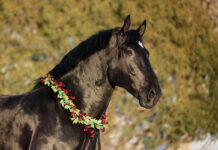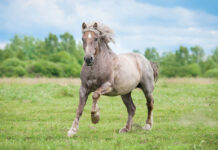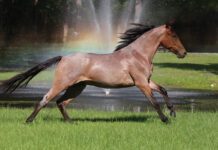The Connemara Pony is said to date back some 2,500 years to when Celtic warriors brought their dun-colored ponies onto the island of Ireland and used them to draw war chariots and carts along the beaches and river plains.

As hard as life was for the Connemara Pony, it was equally as arduous for locals trying to live off the land, and many families could only afford one good pony.
Life was an endurance test for any Connemara Pony that became part of an Irish family. They had to pull heavy loads, working all day every day.
Over time, the breed evolved into one that was distinguished by its hardiness, stamina and gentle disposition. In 1923, to conserve and further develop the breed, the Connemara Pony Breeders’ Society was founded in the town of Clifden, located in the heart of Ireland’s Connemara region.
The Connemara stands 13 to 15 hands, usually averaging 14 to 14.2 hands. Colors include gray, dun, bay and brown, with the occasional black, chestnut or palomino. They are known for being easy keepers.
Their athletic build, stamina, intelligence and heart gives Connemaras natural dressage and jumping ability; they are often found competing in sport horse disciplines against much larger mounts.
When crossed with Thoroughbreds or other large breeds, the result can be a truly remarkable athlete, and in the past decade many top Irish event horses have carried a large influence of Connemara blood.
Over the years, the popularity of the breed has extended worldwide and Connemara Pony Societies have been established in 17 countries, including the United States.
For more information, visit the American Connemara Pony Society at www.acps.org
This article originally appeared in the January 2015 issue of Horse Illustrated magazine. Click here to subscribe!






Beautiful photo.